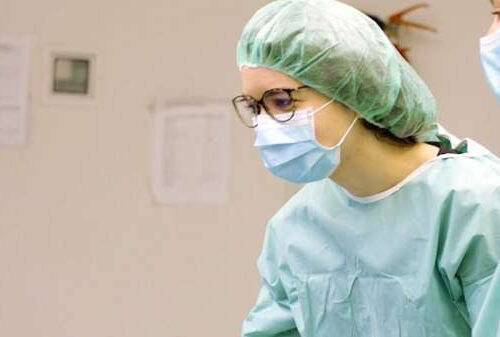by The Francis Crick Institute LAM arrays allows culture of axons in the cm-range after 21days in differentiation or mm-range after 14days in differentiation. μm-ranged motor axons are achieved after 1 day in differentiation. Credit: The Francis Crick Institute Researchers at the Francis Crick Institute and King’s College London have shown that the length of...
Cocktail of two chemicals could help slow down age-related muscular decline
Reviewed by Emily Henderson, B.Sc. Feb 7 2022 Researchers from Tokyo Metropolitan University have shown that a mixture of 5-aminolevulinic acid(5-ALA) hydrochloride and sodium ferrous citrate (SFC) helps slow down aging-related muscular decline in fruit flies, leading to a slower decline in locomotor activity and longer lifespans. This was correlated with better maintenance of muscle...
Chemists Discover Potent Anti-Cancer Agent
New chemical compound destroys cancer cells in low-oxygen environments. A multi-institutional team of researchers led by chemists from The University of Texas at Arlington has published a paper in the Journal of the American Chemical Society that describes its discovery of a potent anti-cancer agent that works exceptionally well amid low oxygen concentrations. The findings reported in...
SARS-CoV-2 Spike protein binds to heart’s vascular cells potentially contributing to severe microvascular damage
A new study has shown how SARS-CoV-2 may contribute to severe microvascular damage seen in severely-ill COVID-19 patients by transforming human heart vascular cells into inflammatory cells, without infecting them. The University of Bristol-led research, published in Clinical Science, indicates blocking antibodies could represent a new treatment to alleviate cardiovascular complications. In this new study, a...
Combination of two cancer drugs make pancreatic tumors treatable with immunotherapy methods
by Technical University Munich First author Chiara Falcomatà (left) running the high-throughput screening. Credit: Technical University Munich Pancreatic carcinoma is a tumor with an extremely poor prognosis for which effective treatments have not yet been found. In a preclinical animal model with mice, a team of researchers has now discovered a way of making pancreatic...
Dissatisfied plastic surgery clients show the downsides of online research
by Aphrodite Vlahos, Anna E. Hartman, Julie Ozanne, The Conversation Credit: Shutterstock A woman walks into a plastic surgeon’s office with an image she has found online. She wants her body to look like the same, and thinks she knows how to get it. She tells the consulting surgeon exactly what she wants: round, 350cc...
Reprogramming a patient’s immune cells to heal the pancreas and restore the ability to make insulin
by Tyrel Linkhorn, University of Toledo Dr. Juan Jaume’s promising research could revolutionize management of a disease affecting an estimated 1.6 million Americans. Credit: University of Toledo Promising research from The University of Toledo suggests it might be possible to cure Type I diabetes by reprogramming a patient’s own immune cells to heal the pancreas...
Discovery of 29 new acne risk genes provides hope for new treatments
by NIHR Biomedical Research Centre Credit: CC0 Public Domain A study of the genetics of acne has identified 29 regions of the genome that influence the condition. These genetic insights offer potential new targets for treatment. They may also help clinicians identify individuals at high risk of severe disease. The research, is the largest study...
No time to exercise? What about three seconds a day?
by Edith Cowan University Credit: Pexels Lifting weights for as little as three seconds a day can have a positive impact on muscle strength, a new study from Edith Cowan University (ECU) has discovered. A collaboration with researchers from Niigata University of Health and Welfare (NUHW) in Japan had 39 healthy university students perform one muscle...
Stroke-Related Restless Legs Syndrome an ‘Emerging Entity’
Pauline Anderson January 17, 2022 More data support the concept of stroke-related restless legs syndrome as an “emerging entity,” investigators report in a new study. New research has identified the lenticulostriate and ventral brainstem as the main regions implicated in stroke-related restless leg syndrome (s-RLS). Researchers also observed dopaminergic dysfunction in patients with sRLS. “Clinicians should be...






